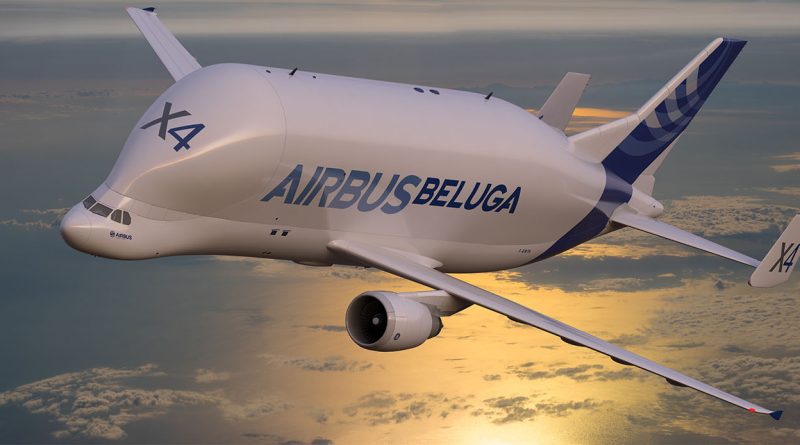Airbus Beluga’s Application to Fly in the U.S.
Airbus Beluga Transport, a subsidiary of the European aerospace conglomerate Airbus, represents a pivotal element in modern aviation logistics. Initially conceptualized to aid in the transport of large aircraft components, the Airbus Beluga has evolved into a versatile cargo transporter. With its distinctive bulbous front and expansive cargo hold, the Beluga stands out in the aviation world. Its design is specifically tailored for oversized cargo, making it an indispensable asset for Airbus’ internal logistics and, increasingly, for external clients in diverse industries.
Since its inception, the Beluga has undergone several iterations, each enhancing its capabilities. The latest models offer increased cargo space and advanced technological features, aligning with the growing demands of global logistics. This introduction of the Beluga into the cargo transportation sector is not just a testimony to Airbus’ innovative approach but also a reflection of the changing dynamics in the aviation industry, where versatility and capacity are becoming ever more critical.
Expanding Horizons: Airbus Beluga’s Application to Fly in the U.S.
The recent application by Airbus Beluga Transport to the US Department of Transport is a strategic move, signaling the company’s ambition to extend its reach beyond European borders, a big story for aviation news. This application for operating clearance in the United States is a significant step for Airbus, potentially opening a vast new market. The U.S., with its extensive industrial and commercial activities, presents lucrative opportunities for outsized cargo transport.
The inclusion of the U.S. in Airbus Beluga’s operational map is more than just a geographical expansion. It marks a pivotal shift in the company’s global strategy, potentially transforming the dynamics of cargo transport across the Atlantic. This move will enable Airbus to tap into the diverse industrial sectors in the U.S., from aerospace components to large-scale industrial machinery, offering a unique solution to the challenges of transporting oversized cargo.
The Impact on Cargo Transportation and Industry Sectors
Airbus Beluga’s foray into the U.S. market is set to significantly impact various sectors. The aircraft’s unique capability to transport outsized cargo offers a new dimension to logistical solutions, particularly for industries requiring the movement of large or awkwardly shaped items. This includes aerospace components, oil and gas equipment, military hardware, and more.
The entry of Airbus Beluga into the U.S. could revolutionize how these industries think about logistics and transportation. The Beluga offers a solution that could streamline operations, reduce the need for disassembly of large components, and expedite delivery times. For sectors like the space industry, where the transport of large modules and components is crucial, the Beluga could become an indispensable asset.
Fleet Expansion and Operational Strategy
Airbus Beluga Transport’s current operations involve the use of Beluga A300-600STs, with plans to integrate all five Beluga STs into the company fleet by 2025. This expansion reflects Airbus’ confidence in the growing demand for specialized cargo transport services. The Beluga’s distinctive design, characterized by its large cargo bay and the ability to load cargo from the front, makes it uniquely suited for transporting large, bulky items that traditional cargo planes cannot accommodate.
The operational strategy of Airbus Beluga Transport is not just about expanding its fleet. It’s also about enhancing its service offerings to meet the specific needs of commercially contracted customers. This customer-centric approach, combined with the unique capabilities of the Beluga fleet, positions Airbus to become a leader in the specialized cargo transport market.
Implications for Global Supply Chain and Logistics
The introduction of Airbus Beluga Transport services in the U.S. is likely to have far-reaching implications for the global supply chain and logistics industry. This move could lead to more efficient transport of oversized cargo, potentially reducing costs and time delays associated with traditional transport methods. The ability to move large items quickly and directly between Europe and the U.S. could streamline operations for various industries, leading to more efficient production and supply chain processes.
Furthermore, the presence of Airbus Beluga in the U.S. market could spur innovation in the logistics sector, encouraging other companies to explore new solutions for cargo transport. This could lead to a more dynamic and responsive global logistics environment, where the speed and efficiency of transportation become key competitive advantages.
Airbus Beluga Transport’s expansion into the U.S. market represents a significant development in the world of aviation and logistics. Its unique capabilities in transporting outsized cargo could revolutionize various industries, enhance global supply chains, and pave the way for new logistical innovations.
